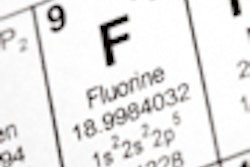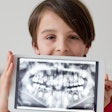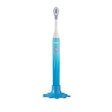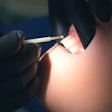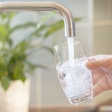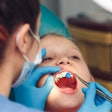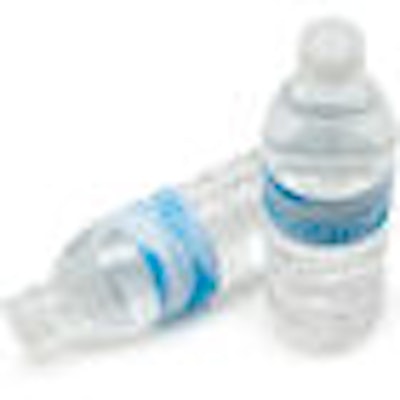
Bottled water already receives much flak because of its contributions to global environmental waste issues. Now a new study finds it may also be contributing to poor oral heath in some children.
Drinking bottled water was an important modifiable risk factor for early childhood caries (ECC) among immigrant, low-income communities, according to preliminary findings from a new University of California, San Francisco (UCSF) study presented at the American Public Health Association Annual Meeting last month.
The retrospective study aimed to identify risk and protective factors associated with untreated ECC at the Family Health Center in San Francisco, which serves an economically disadvantaged and ethnically diverse population, with 3,323 children aged 0-5 who are seen annually.
— Rosalía A. Mendoza, M.D., M.P.H., assistant professor, University of California, San Francisco
The researchers screened 239 children (114 girls and 125 boys) aged 1-5 years who were referred to the oral health screening clinic at the center by family medicine physicians between June 2006 and April 2009. The physicians identified visible caries (non-cavitated and cavitated), and parents self-reported on the oral health status and behavior of the children for routine screening.
High-risk population
The researchers reviewed the self-reported ECC risk factors, such as consumption of three sugary snacks or drinks per day, nighttime bottle usage, frequent use of sugary bottled drinks, and active dental decay among parents or siblings. They also studied ECC protective factors such as whether the parent sees a dentist, whether the child brushes with fluoride toothpaste, and whether they drink primarily tap water or bottled water.
They found that over 60% of the children -- 70% of whom were Latino -- had evidence of ECC, and more than half of the studied children drank bottled water. Living in a fluoridated community does not necessarily mean that everyone in the community is drinking the tap water, they noted.
"Drinking fluoridated tap water may be an important protective factor to prevent ECC," the authors wrote. "Drinking practices may be an important modifiable interventional oral health message to enhance fluoride exposure, particularly if drinking bottled water is initially preferable among immigrant, low-income communities."
Why is bottled water preferred in these communities?
"They have experienced a negative experience of drinking tap water in their country of origin and have adopted the preference for bottled water based on these beliefs," said researcher Rosalía A. Mendoza, M.D., M.P.H. assistant professor in the UCSF Department of Family and Community Medicine.
This belief is further reinforced by experience with bad pipes, bottled water consumer advertisement, and/ or taste preferences in the family.
"This study emphasizes the importance of promoting the use of fluoridated municipal water to prevent ECC, particularly in this high-risk Latino community," Dr. Mendoza said. "We need to promote the use of drinking fluoridated tap water in communities, particularly in our most vulnerable populations. Low-income, Latino parents may have never heard about tap water safety and the importance of tap water fluoridation to protect their child's teeth."
Raising awareness
Dentists, physicians, and social service programs need to know whether their local water supply is fluoridated, they need to understand their patients/clients concerns about the water and assess whether these families understand the connection between fluoride and ECC prevention.
This information can assist healthcare providers in tailoring their oral health messages to families who are at risk for ECC. Health promotion should use multi-lingual health literacy materials during patient encounters and coordinate with local media to promote healthy oral health behaviors, Dr. Mendoza said.
"There needs to be more local dental-medical collaboration with respect to effective dental referrals for young children, unifying messages about local tap water issues that address a community's concerns, and emphasis on adequate fluoride exposure when local fluoridated water supplies are available," she said.
Drinking practices, particularly drinking fluoridated tap water, should be regularly monitored in state and national surveys to measure oral health practices and fluoride exposure, the authors concluded.
Barbara Broffitt M.S. research assistant at the Department of Preventive and Community Dentistry, University of Iowa, told DrBicuspid.com that the UCSF study results are similar to what she and her colleagues found in the Iowa Fluoride Study -- a long-term evaluation of fluoride exposure, nutrition, and oral hygiene in a cohort of infants recruited from Iowa hospitals in the early-to-mid 1990s.
“Subjects that drink bottled water seem to have higher caries rates, but not significantly higher,” she said. Although, she added, “this is a much higher risk population than what we have in Iowa, and the difference in caries rates is more pronounced.”
Broffitt also raised some concerns about the study design:
- This study categorizes children as either tap water drinkers or bottled water drinkers. Where do subjects fall that drink some of each? Very few of the subjects in the Iowa study were exclusively tap or bottled water drinkers at these young ages.
- There may be some demographic factors that put the bottled water users into a lower socioeconomic group, which is also a known risk factor for caries. The study does not do any multivariable regression analyses, so bottled water use has not been adjusted for other known risk factors.
“We do, however, consistently see that fluoridated water is related to less dental caries,” she concluded.




